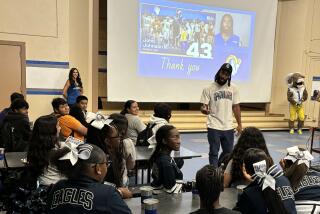Trouble-Shooter : Former Gang Member Ron Johnson Uses Combination of Karate and “10 Rights of Passage” to Help Keep Teen-Agers in Line
- Share via
When Ron Johnson was a 13-year-old member of the Suicide Stompers, a Brooklyn, N.Y., gang, he often found himself in tough situations. But one day, a gang fight changed his life.
“We were fighting and this guy came after me with a gun,” Johnson said. “This was a .38, and when he shot it, it sounded like an atom bomb going off. So I took off running.”
Johnson darted into a recreation center where a group of men dressed in white were practicing karate. When the man brandishing the gun came in, the instructor walked up to him, quickly disarmed him and sent him on his way.
“I was amazed,” Johnson said. “I said, ‘Look, whatever y’all are learning in here, I want you to teach me so I can kick some butt.’ ”
But karate instructor Pedro Viallez would not accept that gangland attitude. Before Viallez allowed Johnson to join the class, “he made me read the Bible, the Koran, the Torah and several other books,” Johnson said. “I was a real gangster.”
Today, Johnson--a black belt and karate teacher--brings the same anti-gang philosophy to Los Angeles youngsters.
Using martial arts and his “10 Rights of Passage Into Manhood,” Johnson teaches black and Latino boys and teen-agers what it means “to be a man.” Johnson developed the “rights” after years of working with and counseling troubled youths.
Johnson, 36, runs the Los Angeles branch of the Little John Davis School of Survival, where he teaches boys a form of jujitsu called Kumite Ryu and Shotokaa karate. Classes are held weekly at Ward African Methodist Episcopal Church, on West 25th Street near the University of Southern California. Tuition is $25 a month.
“We developed this program because of our concern that young black men are not being taught to be men,” Johnson said.
Statistics show that Los Angeles County incarcerates more black men than any other prison system in the world, he said, adding, “It became very clear that we had to organize programs targeted at specific populations for specific purposes.”
Johnson, along with karate teachers Skip Falconer and Joyce Reece, show beginning students how to fall, how to kick and punch, and how to lock up an opponent.
Their philosophy is to teach the boys to avoid trouble, Falconer said. “But if you have to defend yourself, defend yourself in the best way possible so you can get home.”
The instructors conduct workshops, using Johnson’s “10 Rights of Passage” to help black and Latino males deal with the gang situations they may face every day, and show students ways to avoid drugs, truancy and other pitfalls.
“Currently, on the streets of Los Angeles, there are four ways for young men to prove themselves as men,” Johnson said. They are: Get money (it doesn’t matter where), be sexually active, be violent and go to jail.
“Using the martial arts as a way of life, we teach young men that these four things don’t make you a man,” he said.
Johnson, who graduated from Columbia University and works as a consultant for the California Department of Public Instruction, is writing a book for the state on his “10 Rights of Passage.” They are: personal, spiritual, emotional, physical, economic, mental, historical, cultural, social and political.
Johnson exposes the students to his philosophy on each right. For example:
* Personal: Life is hard, but it doesn’t mean you quit. Instead, it means you equip yourself with the skills, self-esteem and self-concept you need to make it through this rough life.
“We teach them under ‘personal’ that they need a super sense of self-esteem to survive,” Johnson said.
* Spiritual: High-risk youths must recognize that there is a force in their lives that will never abandon or forsake them. Their efforts to make their lives positive and productive are God-prescribed and God-supported.
* Emotional: Because they have never been taught to express a full range of emotions, boys learn that it is not unmasculine to be loving and caring. Young men are taught how to initiate positive relationships with the opposite sex.
* Economic: If you are going to be a man, you have to earn money. But before you can earn money, you must learn to manage it. Under “economic,” the students run their own business, invest the money and open a savings account.
* Physical: Because black men die younger than almost any group in America, you have to take care of yourself by eating right, exercising, and practicing good hygiene. Responsible sex is also taught under “physical.”
Under each right, the students are given tasks to complete. For the “emotional” right, for instance, the teen-agers are taught how to approach girls.
“What we did was take them to the mall and asked them which girl they thought was cute,” Johnson said. “We then told them to go up to her and tell her that they had noticed her from across the way and thought she was attractive. Then they were to introduce themselves.”
The students were surprised.
“They came back and said this really works,” Johnson said. “I was able to tell them that people like it when someone is polite and kind.”
Johnson also uses the biographies of historical figures in his instruction. For example, he said, the students recently came to him with an idea for forcing the city of Los Angeles to do something about gangs.
“They wanted to go down to the airport and lie down on the runway to stop the planes from landing and taking off,” he said.
When Johnson asked the students where they had gotten such an idea, they pointed to the biography of Dr. Martin Luther King Jr.
“They had learned that Dr. King was not a wimp because he was nonviolent, but that he took direct action,” he said.
The students also are trained as advocates. They pick a topic to research and prepare a short lecture. They then contact five peers a week, delivering a positive message on the topic.
For instance, 9-year-old Remy Gardner of Los Angeles chose how to do your homework as his topic. After his research, he told the students to “go home, have a snack, watch a little TV and then you do your homework,” Johnson said.
Students are also shown how to write a school assignment and how to turn it in. “The kids really love it and it works.”
Johnson’s karate school also emphasizes the importance of earning passing grades. One student, 17-year-old Maurice Robinson, was making D’s and F’s in school after his father died of cancer four years ago.
“I was devastated when my father died,” Robinson said. “He was my best friend.”
Robinson came to the karate school three years ago. On his last report card, he earned five A’s and one B. He attributes the change to the school.
“This class teaches me discipline and how to concentrate on one thing. That helps me in class,” he said.
Johnson, Robinson said, “has been like a father to me. Before, I just didn’t have the help in school I needed, but he has helped me bring out the confidence that I know is within me.”
Johnson’s highest-ranking students, who have been with him for five years, have earned green belts in karate.
Many of the students live in single-parent homes, and their mothers and fathers like the fact that discipline is reinforced at the school.
Karate teacher and single mother Reece says the class helps her deal with her own son, Charles Peterson, 14, who has earned a green belt. “I’m very hard on my son,” Reece said, “and having these men there to back me up helps him realize that he can’t get over on me.
“I think that when you work with children, you have to work with the whole child. I believe it makes them feel like they are a part of you, and that they are important.”
Los Angeles resident Bonnie Hill, whose 14-year-old son Greg is also a green belt, likes the interaction between her son and other males.
“Being female and raising a male child is really tough because there are some questions that you just can’t answer,” she said.
“It makes me feel good that there are men out there that he can interact with and reinforce the values that I teach at home.”
To illustrate and emphasize the value of hard work, Johnson takes his students to karate tournaments.
“That allows me to tell them that the same discipline that you need to excel in the martial arts is the same discipline you need to excel in algebra, trigonometry and other disciplines,” he said.
And his students do win. In a karate tournament at Culver City Civic Auditorium in late March, Johnson’s students earned six first-place trophies and numerous second- and third-place awards.
Greg Hill took first place in fighting and khata (fighting more that one opponent at a time), and he continued to compete after suffering an injury.
“(Johnson) has taught me that it doesn’t matter if you cry, but it does matter if you quit,” Hill said.
More to Read
Go beyond the scoreboard
Get the latest on L.A.'s teams in the daily Sports Report newsletter.
You may occasionally receive promotional content from the Los Angeles Times.










